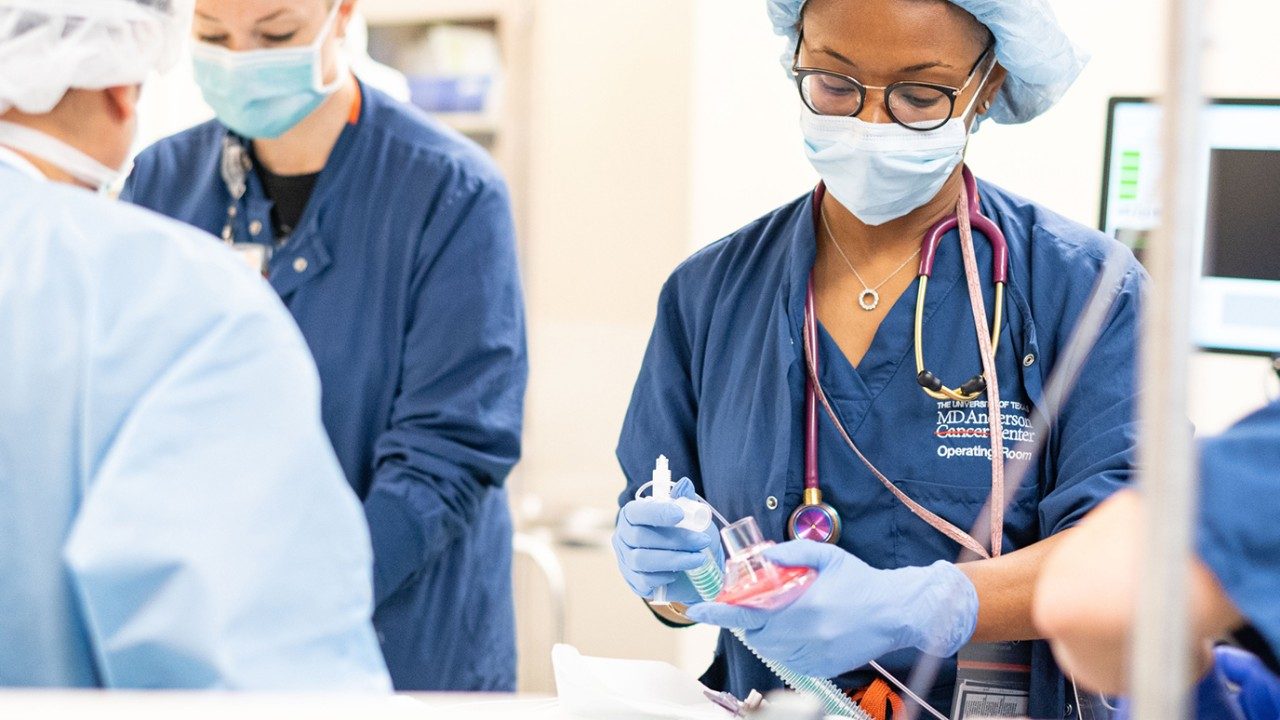Your first colonoscopy: What to expect
- Get Screened
- Mammograms & Breast Examination
- Cervical Cancer Screening Guidelines
- Colorectal Cancer Screening Exams
- Endometrial Cancer Screening Exams
- Liver Cancer Screening Exams
- Lung Cancer Screening Exams
- Mobile Mammography Van
- Ovarian Cancer Screening Exams
- Prostate Cancer Screening Exams
- Skin Cancer Screening Exams
- Women's Cancer Screening
- Men's Cancer Screening
Colorectal Cancer Screening Exams
Men and women at average risk for colorectal cancer should get a screening colonoscopy every 10 years beginning at age 45.
Regular screening exams for colon cancer and rectal cancer can find cancer at an early stage. When found early, the chances for successfully treating the disease are greatest.
Along with regular exams, practice awareness. This means you should be familiar with your body. That way you’ll notice changes, like bleeding or unusual bowel movements. Then, report them to your doctor without delay.
Your doctor can help you decide if you should continue screening after age 75. MD Anderson doesn’t recommend screening for adults after age 85.
What is a colonoscopy?
During a colonoscopy, you will be sedated. Your doctor will insert a flexible tube with a video chip into your rectum and through the length of your large intestine (colon). Your doctor will examine the surface of your colon as they withdraw the tube.
Your colon must be completely clean in order for your doctor to see any abnormalities. The day before the test, you will prepare by avoiding solid foods and drinking only clear liquids. You also have to drink a solution that will cause you to go to the bathroom - probably several times – so there is absolutely no waste in your colon.
One of the benefits of colonoscopy is that your doctor can remove precancerous polyps during the exam without scheduling another procedure.
Alternative tests to colonoscopy
Virtual colonoscopy
If you choose virtual colonoscopy over regular colonoscopy, MD Anderson recommends you get the test every five years starting at age 45. A colonoscopy will be performed if polyps are found.
During a virtual colonoscopy, your doctor performs a low-dose CT scan of your abdomen and pelvis to create 3D images. These images show polyps and other abnormalities inside your colon and rectum.
A virtual colonoscopy requires the same preparation as a colonoscopy. Your colon must be completely free of waste in order for your doctor to get a clear image. Virtual colonoscopies can miss small or hard-to-see polyps.
If your doctor does find polyps or anything suspicious, you will need to get a regular colonoscopy. This test will not be considered a screening test, but a diagnostic test to diagnose the problem. Your insurance may bill this second colonoscopy differently.
If you choose a virtual colonoscopy, check with your insurance provider before scheduling an exam. Not all insurance providers cover the cost of this exam.
Stool-based tests
If you choose stool-based tests, MD Anderson recommends you get tested beginning at age 45. Your doctor will recommend a colonoscopy if signs of cancer are found. Stool-based tests can be performed annually or every three years, depending on the test. There is no preparation for this type of test.
Stool-based tests look for signs or "markers" for cancer in your stool. Here are the two types of stool-based tests that MD Anderson recommends:
- Stool DNA tests can detect changes in DNA that happen as colon cancer develops. These combine testing for changes in stool DNA with a fecal immunochemical test (FIT). These are the most accurate of the stool-based tests. This test should be done every three years.
- Fecal immunochemical tests (FIT) look for proteins found in blood. This can let your doctor know that there may be blood in your stool, which can be a sign of colon cancer. This test should be done every year.
Colorectal cancer symptoms and risk factors
Adults at increased or high risk are more likely to get colorectal cancer. This doesn’t mean you’ll definitely get cancer. But, you may need to start screening at an earlier age, get additional tests or be tested more often. Learn more about colorectal cancer risk factors.
Colorectal cancer often does not have symptoms in the early stages. Most colon cancers begin as polyps, small non-cancerous growths on the colon wall that can grow larger and become cancerous. As polyps or cancers grow, they can bleed or block the intestines. If you have symptoms of the colorectal cancer, talk to your doctor. You may need to start screening at an earlier age, get additional tests or be tested more often.
Colorectal cancer recurrence
If you’ve had colorectal cancer, you need a different plan to check for recurrence. This includes periodic colonoscopy. Print the survivorship screening chart below that best describes your cancer type and share it with your doctor. Your doctor can use this chart to create a more tailored plan for you.
Reduce your colorectal cancer risk
Nothing you do can guarantee that you won't get colorectal cancer. But making the following healthy lifestyle choices will reduce the chances that you will get the disease.
- Get screened. Screening exams for colorectal cancer can find the disease early, when it’s most treatable.
- Maintain a healthy weight. Excess body fat is linked to an increased risk of colorectal cancer.
- Exercise regularly. Aim for at least 150 minutes of moderate exercise or 75 minutes of vigorous exercise each week.
- Eat a plant-based diet. Make 2/3 of your plate vegetables, whole grains and fruit. The other 1/3 should be lean animal protein or plant-based protein.
- Limit red meat. The more you eat, the more you increase your risk. Aim to eat no more than 18 ounces of cooked red meat each week. Red meat includes beef, pork and lamb.
- Avoid processed meat. This includes bacon, deli meats and hot dogs.
- Limit alcohol. For cancer prevention, it’s best not to drink alcohol.
- If you smoke, stop. If you don’t smoke, don’t start
The screening plans on this page apply to adults expected to live for at least 10 years. They’re not for adults who have a health condition that may make it hard to diagnose or treat colorectal cancer.
Featured Articles
Cancer screening exams can detect cancer early, when the chances for successfully treating the disease are greatest.
MD Anderson offers colorectal cancer screenings at the following locations:
- MD Anderson West Houston
- MD Anderson The Woodlands
- Texas Medical Center

Colorectal cancer screening: At what age should I get a colonoscopy?
Colorectal cancer screening can detect cancer early, giving you the greatest chance for successful treatment. While colonoscopy is the gold standard for colorectal cancer screening, you may be wondering when you should get your first test.
We spoke with gastroenterologist Mazen Alasadi, M.D., about the recommended age for colonoscopies.
Most people should get their first colonoscopy at age 45
Current guidelines suggest that you should get your first colonoscopy at age 45 if you are at average risk for colorectal cancer. If no polyps are found during your initial colonoscopy, then you wouldn’t need your next colonoscopy for another 10 years.
Regular screenings are recommended from age 45 through 75.
High-risk groups should start screening earlier
Individuals at higher risk for colorectal cancer should begin getting a colonoscopy earlier than age 45.
If you have a first-degree relative (e.g., parent or sibling) with a history of colorectal cancer, you should get your first colonoscopy at age 40, or 10 years younger than the age at which the family member was diagnosed, whichever is earlier.
Other groups who may need a colonoscopy sooner include those with:
- inflammatory bowel disease or
- inherited genetic changes, such as Lynch syndrome and familial adenomatous polyposis (FAP). Colonoscopy screening for people with FAP can begin as early as age 10.
Consult your doctor about colorectal cancer screening after age 75
While colonoscopies are still recommended for some people older than 75, speak with your doctor to determine if you should continue colorectal cancer screening after age 75.
Your body changes as you age, and for some people, a colonoscopy after age 75 isn’t recommended.
“Having a colonoscopy at age 45 is different than having one at age 75,” says Alasadi. “We consider it on a case-by-case basis.”
For example, some individuals over age 75 want to have another colonoscopy because their doctor found precancerous polyps during their previous colonoscopy. Or a patient could have a family history of colorectal cancer.
Or maybe you’ve begun to develop colorectal cancer symptoms.
“Let’s say you’ve been doing fine and suddenly at age 76, you begin to notice blood in your stool,” says Alasadi. “We don’t know if this could be related to hemorrhoids, diverticulosis or colorectal cancer. We might recommend a colonoscopy, so we can determine the cause of the bleeding.”
Older patients are also more likely to have comorbidities, meaning they have two or more diseases or medical conditions at the same time. For example, a patient older than 75 with heart disease, high blood pressure, diabetes and on blood thinners would need to disclose these conditions as well as current medications to their doctor.
“If a patient is on blood thinners, they have to stop taking that medication before receiving a colonoscopy,” says Alasadi. “I always get this cleared by the patient’s cardiologist or hematologist before the procedure.”
There’s also a greater risk to older people while undergoing anesthesia, so it’s important to consider the anesthesia administered during a colonoscopy.
“We always discuss the risks and benefits of the colonoscopy with each patient,” says Alasadi. “Once we explain all of these things, the patient signs a consent form before we proceed with the colonoscopy.”
MD Anderson doesn’t recommend colorectal cancer screening for people older than 85.
“If you don’t have any more problems or symptoms, you don’t need to have any more colonoscopies,” says Alasadi.
Request an appointment at MD Anderson online or by calling 1-877-632-6789.

What happens if a doctor finds cancer during my colonoscopy?
Most colonoscopies end with a gastroenterologist saying to come back in 10 years for another colorectal cancer screening, a woozy ride home with a friend or relative, and an afternoon spent relaxing while the mild sedation wears off.
But what if a doctor finds cancer during your colonoscopy? What happens then? And, is there ever a chance you could wake up from a colonoscopy to discover you now have an ostomy?
We checked in with colorectal cancer surgeon Abhineet Uppal, M.D.
No surgery or additional procedures will be performed during your colonoscopy
Some people worry that if their doctor finds any type of cancer during a colonoscopy, the procedure could suddenly morph into a major surgery — and they won’t get the chance to weigh in before something irreversible is done to them. But that’s not how doctors — or colonoscopies — work.
“Less than 1% of colonoscopies result in a finding of cancer,” says Uppal. “But even if yours is one of them, no one is going to perform an unplanned procedure on you while you’re sedated. Sometimes, we might have to stop the colonoscopy because there’s too much stool present for us to see things clearly. Or, we might not be able to advance the scope completely because a tumor or some other obstruction is in the way.”
In the case of too much stool, the colonoscopy would simply be rescheduled, and you’d be asked to repeat the bowel prep routine so your large intestine is clean enough for the doctor to see its walls through the scope lens.
If a blockage prevents your doctor from examining the entire colon, though, you’ll need additional scans and possibly exploratory surgery to determine the full extent of your disease.
Either way, notes Uppal, you’d be awakened and given time to process what you were being told before any surgery was performed.
“Even if your bowel was completely obstructed and you needed immediate relief to prevent a rupture, we wouldn’t go straight into surgery without discussing it with you,” Uppal adds.
Here are the steps that will happen if your doctor finds anything suspicious.
Step #1: Analyzing tissue samples: benign or malignant?
If a doctor does find anything suspicious during your colonoscopy, the first thing they’ll do is take tissue samples of it and send them off to a lab for a biopsy. That’s because not all abnormal colon growths are cause for concern.
“A pathologist will look at the cells under a microscope and let us know if they’re benign, pre-cancerous or cancerous,” explains Uppal. “That process takes at least a couple of days.”
Step #2: Determining the cancer type and stage
If a pathologist confirms that cancer cells are present, the next step is determining what type they are, and how much they have spread, if at all.
“Anal and rectal cancers are treated much differently than colon cancer,” notes Uppal. “With colon cancer, the first step is usually surgery, assuming the cancer hasn’t metastasized. But anal and rectal cancers usually start with either chemotherapy or radiation therapy first, followed by surgery later on.”
Once the cancer type has been identified, patients will have additional scans to determine the full extent of their disease. Then, they’ll meet with a surgeon to discuss possible treatment plans.
“Some people worry that if we wait to treat their cancer, it could spread while we’re still deciding what to do,” Uppal says. “But these tumors are not fast-growing. So, there’s plenty of time to sort out the best possible treatment plan for you. To be clear: surgery is not unimportant, but other therapies might be equally important. That’s why it’s so critical to get an accurate diagnosis.”
Step #3: Formulating a cancer treatment plan
Once your doctors have an accurate cancer diagnosis, they can start formulating a treatment plan for you.
“Some people assume that late-stage cancers are inoperable. But that’s not true,” explains Uppal. “Even if your cancer is at stage IV, you may still be able to undergo surgery.”
Rectal cancer in particular requires a highly specialized surgeon, notes Uppal. That’s why it’s essential to go to a comprehensive cancer hospital like MD Anderson, where surgeons are not only very familiar with your exact disease but also have extensive experience in treating it.
“It’s just like our billboards say: ‘Where you go first matters,’” explains Uppal. “At MD Anderson, our colorectal group especially has shown that the quality of surgery plays a critical role in your overall risk of recurrence. It’s also crucial to ensuring that patients have the best possible outcomes, including quality of life after treatment.”
Colonoscopies don’t spread cancer
Regardless of what doctors may find during your colonoscopy, you can rest easy knowing that the procedure won’t spread any cancer that may be present.
“None of the procedures we perform spread cancer,” says Uppal. “That's true for both the colonoscopies we use to find cancer and the surgeries we perform to remove it.”
Request an appointment at MD Anderson online or by calling 1-877-632-6789.

Colonoscopy anesthesia: 7 things to know
If you’ve never had a colonoscopy before, you might have some questions about anesthesia.
Is there more than one option, for instance? If so, how does each work, why might doctors pick one over the other, and what side effects can you expect to experience afterward?
For answers, we consulted anesthesiologist Katherine Hagan, M.D.
How many different types of anesthesia are used for colonoscopies?
Generally speaking, there are three types of anesthesia used for colonoscopies:
- Moderate or “conscious” sedation: This is the oldest method and the one many people are more familiar with. It combines a sedative from the benzodiazepine family, such as midazolam, with a synthetic opioid painkiller such as fentanyl. These are delivered through an IV and may be administered by a trained gastroenterologist or an anesthesiologist.
- Monitored anesthesia care (MAC) or deep sedation: This method typically involves propofol. It, too, is delivered through an IV but will be administered by the anesthesia team. It does not normally require a breathing tube.
- General anesthesia: This is the same type of anesthesia people have when they’re undergoing major surgery, so it is administered by an anesthesiologist. It also requires breathing assistance, because it can suppress normal respiration. Once a patient has a breathing tube in place, they are kept unconscious through a combination of IV drugs and/or gasses delivered through the breathing tube.
Which kind of anesthesia is used the most frequently for colonoscopies?
We shifted to MAC for colonoscopies here at MD Anderson a few years ago. While we use general anesthesia in some cases, most of our patients get monitored anesthesia care now for colonoscopies.
That means going to sleep in one room and then waking up in the recovery area, in terms of what you might remember about it. Routine colonoscopies are normally done only once every 10 years, so it’s not something you’ll have to repeat any time soon, in most cases.
How do patients benefit from deep sedation for a colonoscopy?
It takes more time to properly sedate someone using moderate sedation. And deep sedation with propofol allows a patient to go all the way to sleep, as opposed to just being somewhat asleep, where they still might have some awareness of the procedure. Patients are very unlikely to have any conscious memories of a colonoscopy with propofol.
The drugs used during moderate sedation may also leave patients with a groggy or hungover feeling afterward, and there’s a higher chance of them experiencing nausea or vomiting. That is less likely with propofol.
Finally, delirium is more common among elderly patients receiving medications used for moderate sedation. And those side effects can linger for much longer than with propofol, which wears off more quickly.
How common is general anesthesia for colonoscopies?
We might use general anesthesia if we discover that someone still has food in their stomach or if we know they’re going to have a very long procedure, such as an upper endoscopy that goes all the way down to the bile ducts, or a colonoscopy during which a large polyp will be removed. That’s because there’s an increased risk of aspiration, or breathing in something other than air into the lungs. And that can cause an infection.
But the more sedated you are, the more likely it is that you might need some type of intervention to help you breathe. If you receive deep sedation with propofol, there is always the possibility that you will require a breathing tube if you aren’t breathing well enough on your own. In that situation, you would also receive a general anesthetic. Still, in this situation, intubation is not our plan — it’s our backup plan. We rarely need to use a breathing tube during monitored anesthesia care. It doesn’t happen very often.
Do these drugs have any other side effects?
Sometimes propofol produces an uncomfortable burning or warm sensation in the vein, but it goes away quickly.
Propofol also wears off pretty quickly, so it won’t take long for you to feel normal after you wake up.
Can patients ever drive themselves home from a colonoscopy?
No. Afterward, patients must stay in a recovery area for between 30 to 45 minutes. Then, a friend or family member can take you home. No ride services are allowed. Your driver needs to be a trusted person who’s familiar to you.
Anything else patients need to know about anesthesia during a colonoscopy?
All of our endoscopic procedures are done under the “care team model.” That means you’ll be monitored constantly by either an anesthesiologist or a certified registered nurse anesthetist (CRNA) the whole time you’re under anesthesia.
Anesthesiologists typically cover more than one patient in multiple rooms, but a CRNA will be assigned to take care of you for the entirety of the procedure. And either the anesthesiologist or the CRNA will be in the room with you at any given time.
Request an appointment at MD Anderson online or by calling 1-877-632-6789.
request an appointment online.
Help #EndCancer
Give Now
Donate Blood
Our patients depend on blood and platelet donations.
Shop MD Anderson
Show your support for our mission through branded merchandise.






